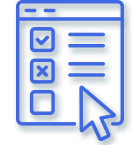What does an Addiction Counselor in Illinois do? What is Their Job Role?
Substance abuse is a critical national problem in Illinois and across the U.S. The current phase, commonly called the opioid epidemic, is an indication of the difficulty of treating and preventing drug and alcohol abuse. Despite a national effort and efforts from communities across the nation, opioid abuse continues to take a heavy toll in addiction, illness, and deaths. Drug and alcohol abuse is the highest in Chicago IL. The state of Illinois trains and certifies substance abuse counselors. Treatment and prevention development are the primary tools against certified advanced alcohol dependence and substance abuse. Counselors form an integral part of the national approach to solving and preventing alcohol and drug abuse.
Compare Popular Online Substance Abuse Counseling Programs
Overview
The Illinois certification process operates through the Illinois Certification Board which is the same overall organization as the Illinois Alcoholism and Other Drug Abuse Professional Certification Association. The certificate standards mix formal education, job experience, and supervised clinical mental health counseling into four grades of credentials. The SAP credential uses the statutory requirement and federal rules to set requirements for education and treatment for transportation safety-sensitive transportation sector businesses and employees.
The ICB developed a code of Ethics for Illinois counselors, and every certified alcohol and drug counselor must understand and formally accept the code. The code sets rules and standards for alcohol and drug counselor conduct. The ICB can enforce violations of the code, and the Board can suspend counselors and cancel counseling credentials in serious cases.
Illinois Licensing & Certifications for Associates & Independent Counselors
Illinois has five types of licensure for substance abuse counselors One type, the SAP, relates primarily to the transportation industry, while the others provide services to the general public.
Certified Alcohol and Other Drug Abuse Counselor CADC
The Certified Alcohol and Other Drug Abuse Counselor CRADC is the threshold level of entry into clinical mental health counseling. The credential requires 225 hours of education and hours of supervised on the job training. The Illinois certification does not apply to any other state. At the Certified Alcohol and Other Drug Abuse Counselor CSADC level, the Certification Board requires 15 hours concentrations in the categories (a) adolescents and their families, and (b) women and their families. The Certified Alcohol and Other Drug Abuse Counselor CRADC is often a support role. The entry-level counselors may work with other professionals and particularly in group settings provide support.
Certified Reciprocal Alcohol and Other Drug Abuse Counselor CRADC
The Certified Reciprocal Alcohol and Other Drug Abuse Counselor CRADC must be competent in screening, assessment, and engaging patients and their families. These professionals must understand and apply best practices for treatment plans, collaboration with other disciplines, and referrals. They must be proficient at clinical mental health counseling and understand ethical rules and responsibilities to consumers. The CRADC certificate is accepted by other jurisdictions outside of Illinois. The certification requires six hours of ethics training. At the CRADC level, the Certification Board requires 30-hour concentrations in the categories of (a) adolescents and their families, and (b) women and their families. Applicants must pass the Illinois alcohol and drug abuse examination and the IC&RC Alcohol and Drug Counseling examination.
Certified Advanced Alcohol and Other Drug Abuse Counselor (CAADC)
The advanced credential requires an in-depth understanding of the processes involved in alcohol and drug dependency. They must detect co-occurring conditions and understand the stages of addiction and recovery. CAADCs must focus on supervision and clinical supervision. At the CAADC level, the Certification Board requires 45-hour concentrations in the categories of (a) services for adolescents and their families and (b) social services for women and their families.
Certified Supervisor Reciprocal Alcohol and Other Drug Abuse Counselor(CSADC)
The Supervisor role is an essential ingredient in preparing for the CSADC; supervising other counselors is more than personnel management, the supervisor must develop and carry out a solid system for treatment and drug education. The CSADC must also provide clinical supervision as needed. The certification requires three examinations. The applicant must pass the Illinois examination for certified alcohol and drug abuse competence. They must then pass the IC and RC ADC examination for reciprocity, and the IC and RC Supervisor examination- the Certified Supervisor exam.
Substance Abuse Professional (SAP)
The US Department of Transportation regulates businesses that use employees for commercial driving. The DOT has drug and alcohol regulations that apply to employees engaged in safety-sensitive jobs and occupations. Employees found to have violated the drug or alcohol regulation must get SAP evaluation before the employer can lawfully return them to their safety-sensitive positions. Whether detected by random, for cause, or any other type of suspicion, the employee must go through SAP evaluation and satisfy the conditions recommended by the SAP counselor. The SAP counselor performs the below-described functions.
- Consults and coordinates reviews with employers
- Performs a complete assessment of the employee to determine a recommended treatment
- Makes referrals as needed and provides case management
- Performs follow up and monitors compliance
- Provides drug and alcohol education and treatment
Education Requirements
CADC education requirements
The CADC requires a minim education attainment of High School Diploma or GED. The holders of an associate’s degree in a related field can reduce the work experience requirement from 4,000 hours to 3,000 hours of supervised work experience. A bachelor’s degree in a related field can reduce the work experience requirement from 4,000 hours to 2,000 hours.
CRADC education requirements
This credential does not require a college degree. Applicants must complete 300 hours of education in a related field, or 20 semester hours of college education. Of the 300 hours, at least 160 hours must relate to Alcohol or Drug addiction.
CAADC education requirements
Applicants must have a graduate degree in a related field of human behavior study, and the graduate program must have a clinical education. The applicant must show 180 hours of specific alcohol and drug abuse. The applicant must also show 2,000 hours or one-year of relevant work experience.
CSADC education requirements
The applicants for the supervisor positions usually have college degrees, but it is not required. You can qualify for the supervisor credential if you first have the CRADC certification. The supervisor credential requires 350 hours of qualified education.
The SAP
The DOT rules apply to air travel, trucking, railroads, mass transit, oil and gas pipelines, and other vital transportation activities. The Illinois Substance Abuse Professional must function in a business setting that involves communications with the public (education and prevention) and with employers and employees. The competencies for assessments and referral are important as is case management. The SAP is the main point of decision for the benefit of the public. He or she does not work for the employer not have any duty to the employee beyond fairness and following the rules.
Counselor Testing & Examination Process

IBS certification requires evidence of the education, work experience, and supervised on the job learning. The ICB uses letters and official documents to confirm time spent on the job training and past employment that may qualify as related experience. It is useful to note that work experience includes volunteer work, and this is particularly relevant to recovered addicts that take part in clinical mental health counseling programs. The voices of recovered addicts are powerful and can impact recovering addicts and those trying to decide to initiate treatment.
CACREP Accredited Online Certification

Two types of accreditation are recognized in the United States; institutional and specialized. Institutional accreditation takes the entire institution into account while the specialized focus on professional preparation programs. The Council for Accreditation of Counseling and Related Educational Programs (CACREP) is a specialized accreditation that focuses on master’s and doctoral degree programs in counseling at colleges and universities worldwide. Only already-accredited institutions are eligible for CACREP review. The review for accreditation will center on programs offering graduate degrees in clinical mental health counseling.
Find Your Online Addiction Counseling Program
Choosing a CACREP-accredited program ensures that the program meets the highest of quality standards. Many counseling specialties are accredited bythe CACREP, including addiction counseling. Accredited counselor CADC programs prepare individuals to work with those affected by addictive behavior and their families. Addictive behaviors include alcohol, drugs, food, gambling, sex, and anything else that negatively affects your personal or work life by creating addiction behaviors.
CACREP-accredited programs will focus on treatment models and the phases of addiction including prevention, recovery, and relapse prevention. These 60-semester hour programs will include the application of interventions. When students choose a CACREP-accredited program they can be confident that:
- the program meets or exceeds national standards
- the program will focus on professional counseling rather than psychology oreducation
- the program has an excellent reputation
- CACREP graduates statistically receive higher scores on the National Counselor Examination for Licensure and Certification (NCE).
- the requirements for licensure will be met.
Illinois Department of Financial and Professional Regulations (IDFPR)
Professional Counselor Licensing and Disciplinary Board
The Illinois Professional Counselor Licensing and Disciplinary Board focuses on the regulation of the counseling industry, overseeing licensure, practice, complaints, and disciplinary action. The Board oversees counseling practices, as well as advises the IDFPR Secretary on issues that affect public policy relating to the industry. It is their responsibility to recommend educational programs geared toward clinical mental health counseling careers and continuing education. The Board also monitors the performance and conduct of licensed counselors in Illinois.
Address
320 W. Washington Street, 3rd Floor
Springfield, IL 62786
Phone
(217) 785-0800
Website Address
https://www.idfpr.com/profs/ProfCounselor.asp
Licensure:
- Licensed Clinical Professional Counselor (LCPC)
- Licensed Professional Counselor (LPC)
Clinical Supervision Explained

Clinical supervision is a process of guided instruction and learning. The substance abuse counselor CADC has a unique position and great responsibility. Clinical supervision focuses on the skills and abilities needed in the process of delivering treatment and education. A clinical setting is any place or time in which the alcohol and drug counselor CADC interacts with patients, families or their problems.
The goal of clinical supervision is to ensure the quality of patient care and to protect the public. The alcohol and drug counselor CADC must use critical thinking to form ideas and concepts that can make treatment effective. The supervisor uses observation and assessment to indicate strengths and areas for improvement. The supervisor must create an atmosphere in which the applicant will learn to perform services at a high level of quality and to perform critical self-assessment. The applicant must earn and grow as a professional by incorporating experience into better and more diversified approaches to problems.
Renewal and Continuing Education
Continuing Education Policy
Certified counselors must perform 40 continuing education units to maintain certification in good standing. The drug abuse counselor CADC must earn the CEUs within the two-years between renewals. The ICB recommends 20 CEUs per year. One college semester credit hour equals 15 CEUs, a trimester hour equals 12 CEUs, and a college quarter equals 10 CEUs. The ICB must accept the coursework or approve a petition for it. Some coursework can fit into both of the categories described below.
A drug abuse counselor CADC may receive credit for a particular training event or course only once whether repeated or not, and credits taken before or after the two-year window may not apply to the 40-hour requirement. The UCB uses two categories for CEUs.
- Category One requires 15 CEUs in education specifically related to alcohol or other drug dependency or abuse. For example, research on the effects of opioids on the human body and mental processes.
- Category Two relates to the core skills and competencies required for effective counseling. The ICBB requires 25 CEUs in Category Two. These counselor skills and knowledge educational studies do not have to be specific to alcohol or other drug abuse. CSADCs and CAADCs are the credentialed counselors that provide supervised clinical training. The CSADCs and CAADCs must complete six of the 25 CEUs on subjects related to providing clinical supervision. For example, teaching intervention strategies, or updates on the latest legal requirements for confidentiality.
Renewal
Certified counselors must renew their certifications every two years. The renewal runs for two years during which time the counselors must complete continuing education. The ICB sets Renewal fees based on the type of credential. Renewals are necessary to remain in good standing as a credentialed counselor.
Potential Counselor Career Path Options
- Addiction Counselor
- Alcohol and Drug Addiction Counselor
- Behavioral Health Specialist
- Certified Addiction Drug and Alcohol Counselor
- Chemical Dependency Counselor
- Mental Health Counselor
- School Counselor
- Substance Abuse Counselor
Associations & Organizations

Illinois Alcohol and Other Drug Abuse Professional Certification Association also does business as the Illinois Certification Board. The Association is the Illinois member of the International Certification & Reciprocity Consortium (IRC&RC). The ICB offers five primary Illinois substance abuse counseling credentials and some specialized certifications.
Illinois Association for Behavioral Health is an advocacy and public education organization. They focus on public information, drug education, and public policy. The association advocates for legislation to enhance resources available to fight addiction and prevent abuse.
